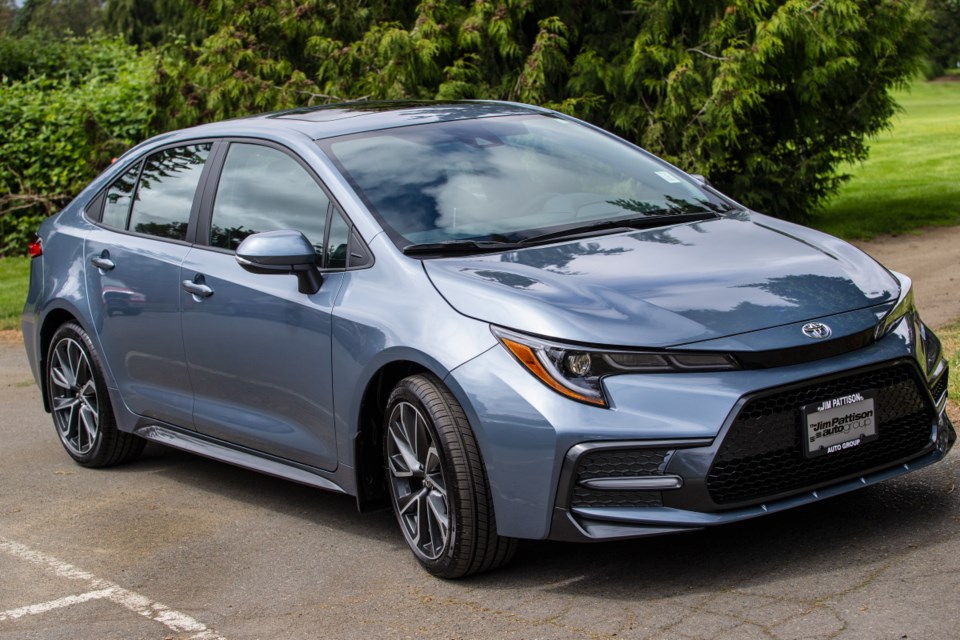If you can’t understand what the fuss over SUVs is all about and yearn for a conventional compact four-door sedan, the 2020 Toyota Corolla is your ride.
Not a week goes by without a manufacturer announcing yet another SUV or crossover.
While some manufacturers have publicly stated that they will no longer produce conventional sedans after this year, others, such as Toyota, have reaffirmed their commitment to the segment.
In the past two years, the Corolla’s main competitors — the Honda Civic and the Mazda3 — have both been completely revamped.
The Corolla is arguably the world’s most popular nameplate, with more than 46 million vehicles sold since it was first introduced in 1966. This is the model’s 12th generation.
(This review is for the Corolla sedan. I have previously reviewed the Corolla Hatchback.)
In Canada, the 2020 Corolla starts at $18,990 for the base L model and a manual transmission. I drove an SE model with a continuously variable transmission, with a list price of $23,290.
The new Corolla now sits on the Toyota New Global Architecture platform, a chassis that the company claims is 60 per cent stiffer than last year’s model.
The new car rides on a new multi-link rear suspension, which elevates the Corolla’s handling to a new, higher level. While its ride has always been comfortable, the nameplate wasn’t always synonymous in the past. With the upgraded chassis, the new Corolla sedan can actually be regarded as fun to drive.
The new car feels more confident in corners. The SE model benefits from a sport-tuned suspension to give a more sporty feel on back roads.
Toyota has also changed the product offerings to cover three groups. The L, LE and XLE now come with a 1.8-litre four-cylinder engine with 139 horsepower and 126 pound-feet of torque. The S line includes the S, SE and XSE, powered by a new, larger 2.0-litre four producing 169 hp and 151 lb.-ft. of torque. The third line is fitted with a gasoline-electric hybrid powerplant (a first for Corolla), borrowed from the Prius.
The extra oomph between the 1.8- and the 2.0-litre engine is noticeable. The Corolla now pulls from a stop with authority. While the vehicle was fitted with a CVT — a transmission not known for pulling power — Toyota added a physical first gear into the mix.
This addition gives the Corolla a leg up in low-speed acceleration, putting it in the same league as a conventional automatic-transmission unit.
While no sports car, power delivery is linear, with ample power to pass or merge on the highway.
The cabin feels more upscale than before, abandoning its econobox roots. The quality of the materials is right up to what one would expect from a Toyota — functional and durable.
The driver gets a eight-inch touchscreen infotainment display with a rotary knob. Navigating the various menus and sub-menus is fairly intuitive, and the screen is sharp.
Toyota includes Apple CarPlay, but Android users will go away disappointed.
My tester had an upgraded option package that included a wireless charging dock for a cellphone.
Legroom in the rear is the most generous in this group, at 1,052 millimetres (the Mazda3 only has 892 mm by comparison). Rear headroom is good, even for occupants approaching six feet tall.
The rear occupants get cupholders, but no vents or power outlets (parents with children be warned).
The 60/40 seatbacks fold completely flat.
What is impressive is Toyota’s Safety Sense 2.0 suite. Standard on all trim levels, it offers a host of features to detect and prevent a collision.
It includes a pre-collision system with daytime/low-light vehicle and pedestrian detection, plus Daytime Bicycle Detection (yes, that’s its full title), lane-departure alert with steering assist and road-edge detection, automatic high beams, lane-trace assist and dynamic cruise control with radar in the CVT.
Blind-spot monitoring is standard on top trims, optional on others. Hill-start assist is standard.
Toyota now offers Safety Connect (available on XLE and XSE models), a system that offers emergency services, roadside assistance and help to locate a stolen vehicle.
Despite the popularity of hatchbacks in Canada, sedans still account for the majority of Corolla sales, according to Toyota. While the popularity of SUVs continue unabated, those wishing the most up-to-date technology and fuel economy can now depend on the new Corolla to deliver in the years ahead.
The Spec Sheet
Type: Compact four-door sedan, front engine, front-wheel drive
Engine: 2.0-litre four cylinder, 169 hp at 6,600 rpm, 151 lb.-ft. of torque at 4,500 to 4,900 rpm
Transmission: CVT
Dimensions (mm): Length, 4,635; width, 1,780; height, 1,435 ; wheelbase, 2,700
Curb weight (kg): 1,395
Price (base/as tested): $23,290/ $27,035 (includes $1,645 freight and PDI and $100 AC tax)
Options: SE upgrade package $2,000
Tires: 205/55 R16 on alloy wheels
Fuel type: Regular
Fuel economy (L/100km): 7.6 city/ 5.8 highway
Warranty: Three years/60,000 km new car, five years/100,000 km powertrain and three years/ unlimited km roadside assistance



